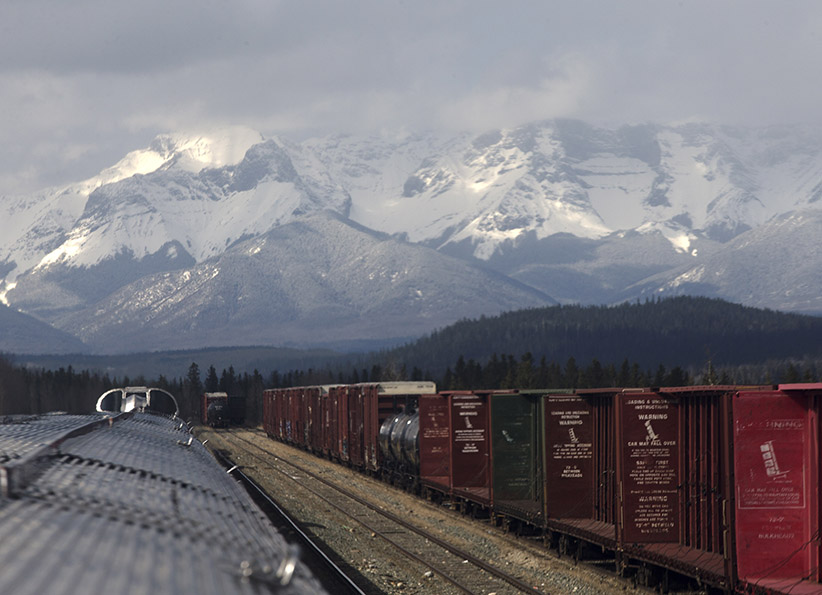Talking Points: Of refugees and scuffed veggies
Speed read the news with our Talking Points round-up—our short takes on the week’s news—and sound like the smartest person in the room.
A general view of waste piled up along a street in the northern Beirut suburb of Al Fanar, Lebanon, 26 February 2016. The Lebanese cabinet reportedly canceled plans to export the garbage to Russia, causing the waste crisis to return to its starting point. The crisis led to the eruption of mass protests in summer 2015 which were organized by activist groups demanding the government to find a solution as well as to solve other problems. (Nabil Mounzer/EPA)
Share

Need an answer for that? Trying to look like the smartest person at the dinner party? Our Talking Points have you covered. Read our short takes on some of the big stories from the week that was:
1. Canada proves its welcoming worth.
Last week, Canada welcomed its 25,000th Syrian refugee since November, meeting the Trudeau government’s campaign commitment. It took two months longer, and was more chaotic, than originally envisioned, but that shouldn’t detract from the accomplishment. The Liberals banked on Canadians’ generosity, and were right to do so. Thousands have opened their arms, wallets and homes for the new arrivals. And thousands more stand at the ready to greet and help as many as 25,000 more Syrians scheduled to arrive by the end of 2016. We should all be proud.
2. Don’t judge a beet by its cover.
Remember the Great Cauliflower Crisis, when a head sold for $8? Thanks to a cheap loonie, the price of fresh fruits and veggies surged 18 per cent in early 2016, Statistics Canada data confirms. But before we complain too loudly, consider that Canadians trash $31 billion worth of food annually because of best-before dates or unappetizing looks. Fortunately, the Danes have a solution. A new Copenhagen supermarket sells (slightly) expired and imperfect-looking foodstuffs at steep discounts, helping to keep cauliflower—or a scraggly version of it—on the country’s dinner plates.
3. Droning on—in a good way.
Rescue workers in Australia are now using drones to spot sharks in the ocean and help swimmers in danger. “Little Ripper,” as one $250,000 unmanned aerial vehicle is affectionately named, uses an HD camera to relay live footage to workers on the ground and can also drop a rescue pod in an emergency. Meanwhile, in the U.S., the Federal Aviation Administration launched a committee to draft recommendations that ease restrictions on drones hovering in crowded public places. Hopefully one idea includes getting rid of that annoying buzzing sound.
4. Up with the monarchy!
Monarch butterflies hibernating in Mexico’s mountains covered four hectares this winter, a threefold increase from last year, according to a World Wildlife Fund study. Thanks to conservation efforts like planting more milkweed (butterfly food) and stopping illegal logging in Mexico, experts estimate the monarch population, which migrates as far as 5,500 km to Mexico each year, now reaches 140 million, compared to 35 million only two years ago when the orange-and-black butterfly appeared to be headed toward extinction. Long may they reign.

5. Cutbacks coming in China.
China does everything big—including issuing pink slips. Beijing officials are looking to slash 1.8 million jobs in the country’s coal mines and steel mills as growth slows in the world’s biggest emerging economy. The mass layoffs are part of a broader plan by President Xi Jinping to reposition China as a country where future wealth will be driven by consumer spending, not massive public infrastructure projects. To put things in perspective, Alberta’s oil patch, hit hard by the global rout in oil prices, shed as many as 100,000 jobs last year, according to industry sources. Or as the Chinese might dub it: a rounding error.
6. Fortress Europe strengthens its ramparts.
The backlash against migrants and refugees is picking up steam across the continent. More than 10,000 people—mostly Iraqis and Syrians—are stranded at Greece’s northern border with Macedonia after several EU nations tightened access rules. And in France, the “Jungle” migrant camp near Calais was the scene of fires and violent protests this week as police enforced a court order allowing its partial dismantling. The continent’s greatest humanitarian crisis since the Second World War is about to get worse.
7. Driverless cars will drive us—and, potentially, drive us crazy.
Instead of being the saviour to the long morning commute, a new study says driverless vehicles could actually lead to more traffic congestion. More people would travel by car instead of using the train or bus, for example, and the extra traffic could potentially eliminate any environmental benefits from autonomous driving. The technology evidently still needs tinkering too, as Google accepted “some responsibility” for a collision one of its self-driving cars had with a bus last month. No injuries were reported, but Google will meet with California’s Department of Motor Vehicles to discuss what went wrong in the accident. Regardless, drivers still have plenty of reasons to lean on the horn.
8. Good night, and s-weed dreams.
A third of Americans are sleep-deprived, says a new survey by the U.S. Centers for Disease Control and Prevention, logging less than seven hours of shut-eye per 24-hour period. And, not coincidentally, about the same proportion are obese. A separate study this week linked lack of sleep to chemicals in the brain that make people crave unhealthy, high-calorie foods like chips, candy and cookies. The effect is apparently similar to the marijuana “munchies.” But nowhere near as calming.